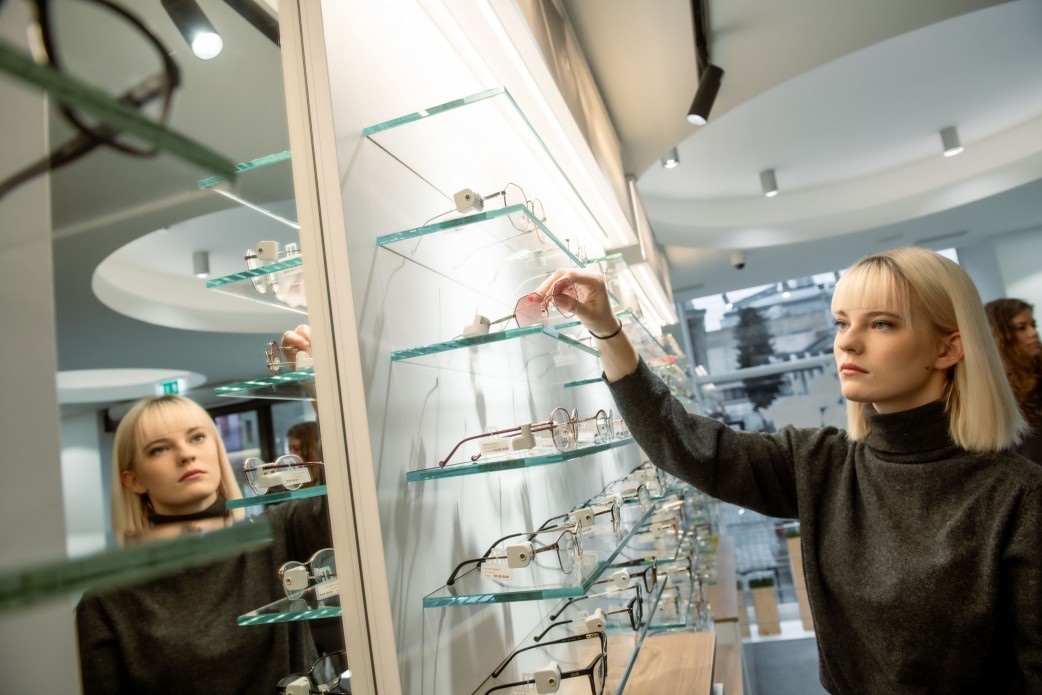To find out about the most suitable vision correction option, register for a visit, or find out other important information, leave your contacts, and we will contact you as soon as possible.
Glasses
The collection of eyeglass frames in the Centers of Vision Excellence is based on fashion trends, while not neglecting the classics.

Here you will be able to choose the one that best suits your taste, face shape and needs - from bright and colourful to classically elegant metal or plastic frames. The range includes Guess, Liu Jo, Ted Baker, Calvin Klein, Ana Hickmann, Christian Lacroix, Gant, Hackett London, Rodenstock, Hugo Boss and other brand glasses.

What to do if you need new glasses:
- If you have previously had glasses or a vision specialist has written a prescription, be sure to bring them with you when you visit. Even if you do not use them. It is essential to understand the reason for not liking and the cause of the discomfort.
- If contact lenses are used daily, please bring a contact lens storage container and contact lens fluid with you when visiting.
- Information about the previous experience of the wearer of spectacles or contact lenses will undoubtedly help the vision specialist evaluate the most appropriate type of vision correction for the patient.
There is no formula for finding the perfect spectacle frame. Still, several aspects are worth considering to make a valuable, appropriate, and enjoyable choice for the wearer.
- It is essential to be aware of the daily activities and lifestyle, habits and purpose of the spectacle wearer (reading, driving, knitting, sports, etc.).
- When choosing a glasses' frame, sometimes the necessary adjustment, namely the prescription for spectacles - can limit the choice.
- When choosing a glasses' frame, sometimes the necessary adjustment, namely the prescription for spectacles - can limit the choice.
The most critical parameters in choosing a frame are the size of its window, for example, whether it is not too wide or not against the cheeks, as well as its distance from the eye (vertex distance) - at what angle is the frontal part of the frame in relation to the eyes and in the centre of the window or as close to it as possible. Of course, when choosing the glasses' frame, it is also necessary to assess whether it rests firmly on the nose and whether the length of the frame's legs is appropriate.
IMPORTANT to note that the frame with corrective lenses may result in a different appearance than those tried in optics with demo lenses. Also, the weight of glasses with corrective lenses usually increases slightly. Besides, it is not uncommon for patient refraction to make it impossible to insert spectacle lenses with the optical power specified in the prescription. For example, in the case of a high degree of myopia, it is recommended to choose a spectacle frame with a smaller window because the edges of the minus type lenses are thick and may turn out to be even thicker than the edge of the frame itself.
That is why it is important that a certified and trained specialist, who, unlike the patient, knows all the nuances of glasses and their frames, helps to make the right choice in the search for both spectacle lenses and their frames.
The choice of spectacle lenses and the choice of glasses frames depend on the prescription of spectacles and the patient's daily habits. Optometrists will recommend choosing spectacle lenses with a clear coating that provides higher visual quality. Lenses with a hydrophobic (water repellent), oleophobic (fat repellent) coating, as well as a coating that is more resistant to scratches, are also available. These coatings will make it easier to care for the glasses and help extend the glasses' life.
Depending on the glasses' prescription and diopters, it is possible to choose glasses lenses with a higher refractive index, making the spectacle lenses thinner, lighter and more durable.
Most importantly - the glasses must be comfortable and liked by the wearer!
Some of our tips, tricks and observations for wearing glasses:
- New glasses wearers are often worried about getting used to this type of adjustment. This question cannot be answered unequivocally - the main thing is not to be afraid and try because only it can understand whether this type of vision correction will be suitable for the patient in the long run. If an eligible vision correction device is chosen, it should only create comfort, not discomfort.
- Various offensive prejudices about the use of glasses are widespread in society, especially among young people. Many who are indicated for this type of vision correction are ashamed of the need to wear spectacles. Unfortunately, this is also why young people often do not follow the doctor's recommendations and wear glasses irregularly. However, be aware that glasses can serve as an optical correction tool and a great and stylish accessory. Glasses have long been a fashion item. They are used by many celebrities (even without visual impairments) because it is an excellent way to give your appearance a "twist". Also, many young people with good eyesight buy glasses only as an accessory to accentuate their style. That's why a wide and varied range of frames and spectacle lenses are available so that each patient can find the most suitable option for their appearance and lifestyle.
- Optometrists and ophthalmologists are often confronted with patients' perceptions that wearing glasses for a long time worsens their vision over time. Still, it is a misconception that the deterioration in vision is in no way related to the use of glasses. On the contrary, they only improve visual comfort.
- Suppose a patient is prescribed glasses but chooses not to use them for various reasons. In that case, it should be taken into account that asthenopic complaints may occur - headaches, eye fatigue, blurred vision, etc., which patients tend to associate with factors other than not wearing glasses.
- The primary function of glasses is to help us see clearly and develop vision in young children, for example, in the case of amblyopia. Suppose glasses are indicated for a child but not used. In that case, it can contribute to the development of amblyopia or lazy eye, which unfortunately can no longer be treated without timely application of a corrective eye (glasses and/or occlusion), and most often, one eye is not able to see 100%, not without spectacle correction.
A choice of suitable glasses according to the conditions under which they are worn
When using eyeglasses, patients should not put up with restrictions caused by them. There are developed various types of special eyeglasses according to the conditions under which they are used:
- Optical swimming goggles. Ideal for active people who need to wear glasses or contact lenses. Such goggles provide good visibility and eliminate the risk of dangerous eye inflammation caused by swimming with contact lenses.
- Optical sports glasses. Suitable for various sports, such as cycling glasses with specially curved spectacle lenses, they serve as both an optical corrector and goggles.
- Optical sunglasses - lenses are tinted and with the optical correction required by the customer.
- Clip-on optical spectacle lenses or “clips”. It has easily affixed and easily removable tinted or polarized eyeglass lenses that can be clipped-on existing optical glasses.
- On the other hand, for use after eye surgeries, such as cataracts or laser surgeries, special postoperative goggles have been developed, which are available with or without sunscreens and protect the eyes from various eye irritants that can negatively affect the result of the eye surgery. There are also unique eye masks applied to the eyes at bedtime in case of dry eye syndrome. This warming mask warms the Meibomian glands in the eyelids and helps their secretions to liquefy, thus moisturizing the eyes better.



